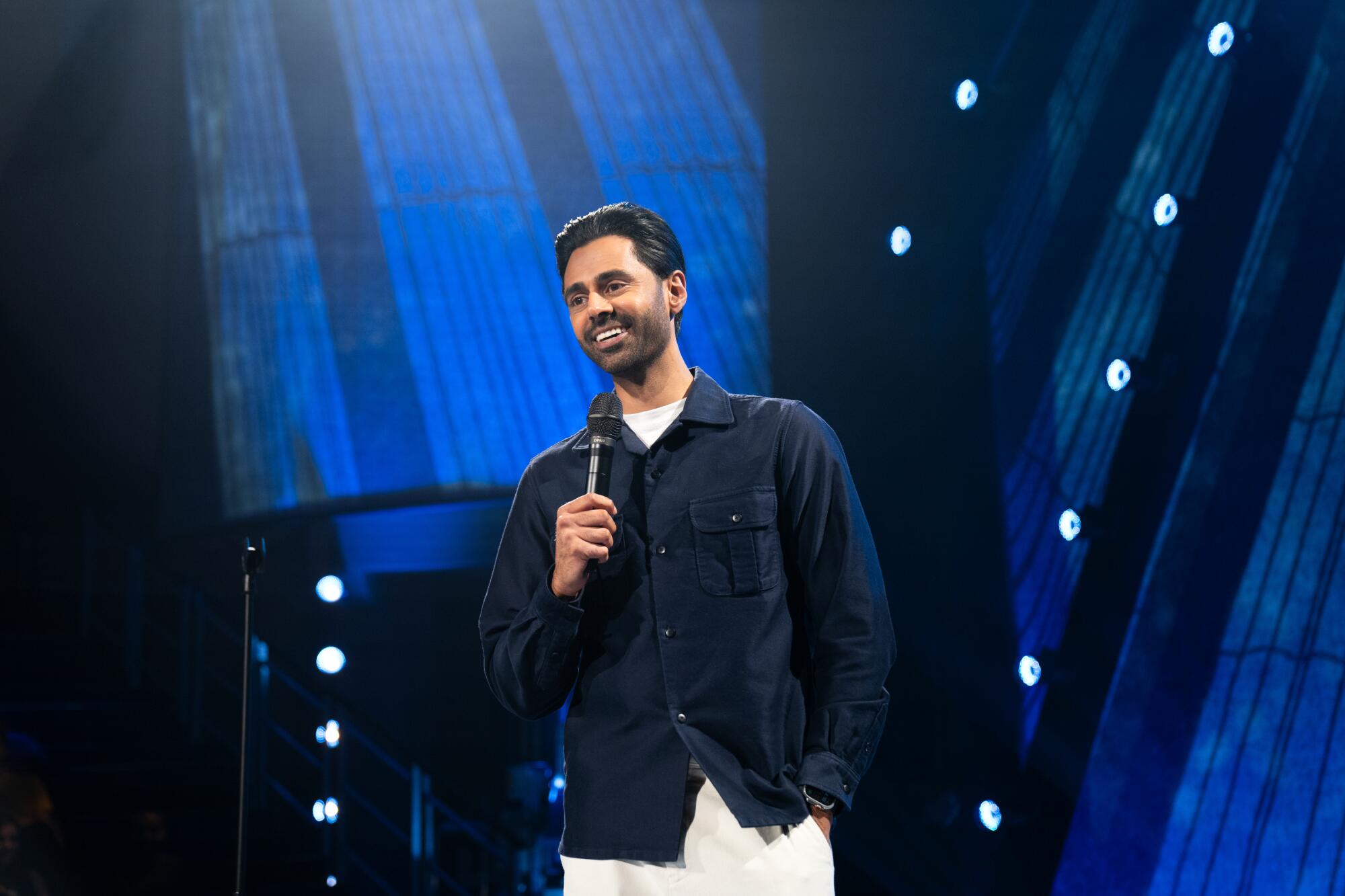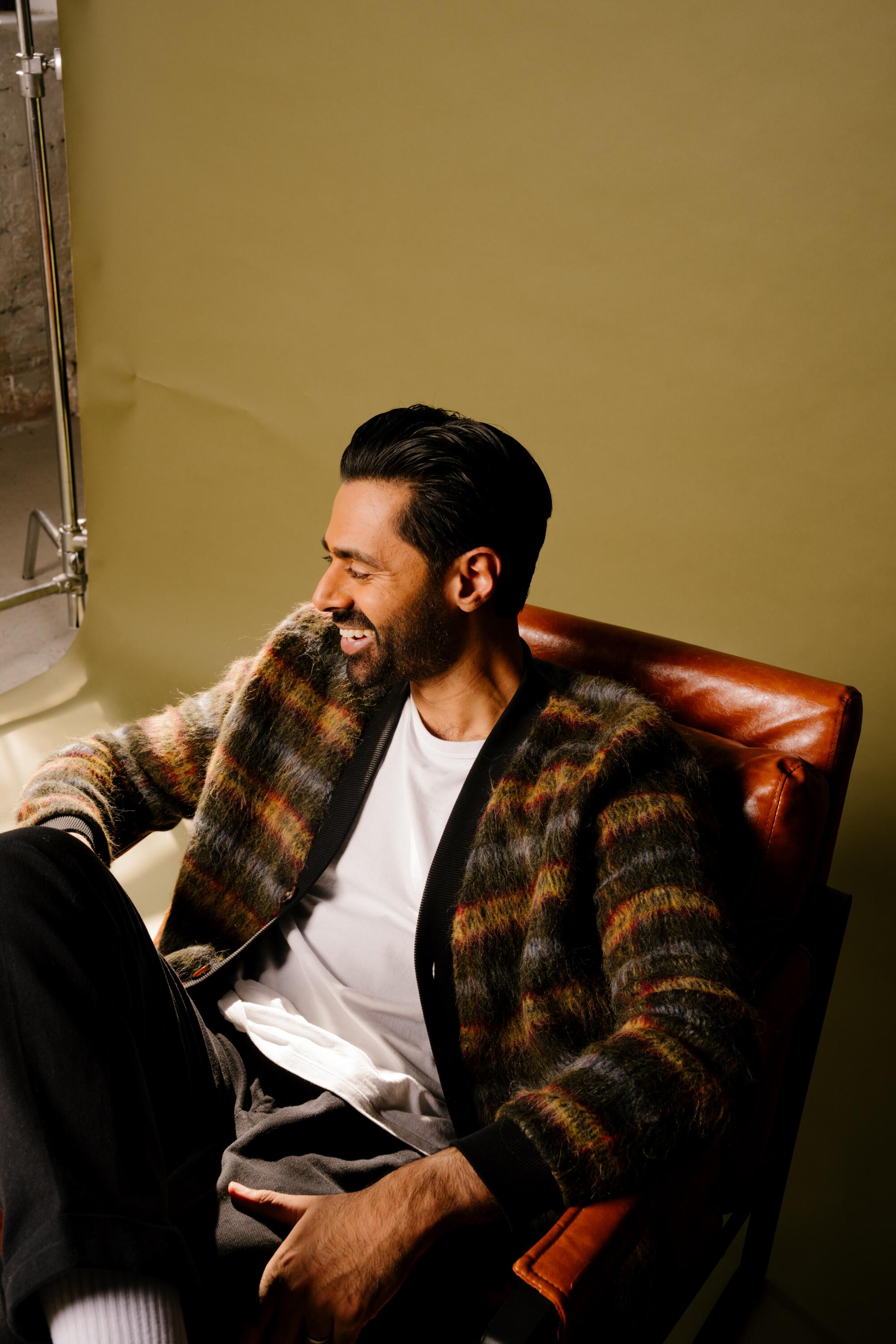“Off With His Head” is the new, aptly titled comedy special from stand-up comedian Hasan Minhaj. The former “Daily Show” senior correspondent and host of “Patriot Act” survived the comedy equivalent of a public execution last year and now, the dark experience is grist for his smart, funny and topical one-hour Netflix special that’s now streaming.
Minhaj, 39, became the center of a quasi-controversy over truth in comedy when the New Yorker published an article last year accusing him of fabricating personal events in his two Netflix stand-up specials, 2022’s “The King’s Jester” and 2017’s “Homecoming King.”
The investigation wasn’t part of a fact-check blitz targeting successful stand-up comedians with TV specials. It was specific to Minhaj and went to great lengths to show that he embellished aspects of his personal life in some of his jokes. The focus was on his claims of being discriminated against because of his skin color and being profiled because he’s Muslim. The fact that the story gained any traction, let alone became a thing for about 10 minutes, is still a mystery. Or maybe it’s not. There are perils to joking while Muslim.
Minhaj released a video response explaining and defending the creative decisions he’d made in his specials, and he provided audio recordings, emails and context to allege that the New Yorker ignored context that he had given it for the story.
As social media argued the merits of emotional truth versus historical accuracy, Minhaj says he lost the most coveted gig of any comedian’s career: host of “The Daily Show.”
“We’ve all failed in our lives,” Minhaj said earlier this year while performing at the Netflix Is a Joke festival. “But have you ever failed so bad, you bring back Jon Stewart? I saved a dying institution. You’re welcome.”
Now he’s back with his head and sense of humor firmly intact with a special that explores gerontology and the U.S. Congress (“a mass nursing home.gov”), the cultural differences between Caucasia and Beige-istan — as he collectively describes such immigrant groups as Latinos, Indians and Arabs — and the joys of simultaneously teaching his small children and aging parents how to use an iPad.
Minhaj, who also hosts the podcast “Hasan Minhaj Doesn’t Know,” spoke with The Times about approaching comedy without fear. This conversation has been edited for clarity and length.

Hasan Minhaj in his new Netflix stand-up special “Off With His Head.”
(Amir Hamja/Netflix)
The best stand–up comedy requires taking chances and making yourself vulnerable. Was it hard to get back to that place after your comedy was in essence fact-checked?
The beautiful thing about comedy is that it’s one of the only art forms where you do have to [talk about] the elephant in the room, even if you’re the butt of the joke. Keeping that in perspective is really, really important. Comedy is such a unique art form in the sense that you’re building pressure and then releasing it. It allows you to constantly have that release. You can take two things like joy as a form of release — just being silly, hilarious, naughty, irreverent — and emotions like pain, humiliation, then trauma and tragedy — and you can also have a release. That was my approach with it.
Did the fallout from the New Yorker article cause you to change the way you approach writing and performing with this special?
No. I [already] put out a 21-minute video about what had happened. I showed the receipts and the material of the things that I provided that didn’t get included [in the article]. So it was kind of entered into the public record, and that allowed me to [say,] “Hey, if you want to go discuss, talk about or litigate, there’s a whole deep dive on it — tape, emails, receipts, all there, beat by beat by beat.” Now we can focus on just this piece of work. I get to approach this hour as its own unique, individual piece of work. Maybe other [comedians] would have tried to integrate it into the show. Do I talk about this? Do I not talk about this? I don’t have to make that calculation.
You tackle the political divide, folks still mispronouncing your name [“Hey, Hamas”], Asian-on-Asian racism, immigrants — so the quasi-scandal, it’s hardly the dominant theme of your special. But when you do talk about it, it’s hilarious. You say,“It’s a dorky controversy. It’s not even a good one. I didn’t f— a pοrn star. I didn’t diddle a boy. I got caught embellishing for dramatic effect. Same crime your aunt is guilty of over Thanksgiving.” I also love the laborious detail you provide about the car you drive in case your set is fact-checked.
That’s right. The Kia Carnival.

Hasan Minaj on addressing the New Yorker controversy in his new stand-up special: “The beautiful thing about comedy is that it’s one of the only art forms where you do have to [talk about] the elephant in the room, even if you’re the butt of the joke.”
(Amir Hamja)
You give lease agreement details.
I’m an internet bad boy. What can I say?
The special goes into a world that I’ll describe as a third-rail of race and cultural humor.
For the longest time, culture and the framing of the American cultural narrative existed in a black-white dichotomy. But there’s this third thing in America called Beige-istan, which is like Indians, Latinos, Filipinos, Arabs, wherever Bruno Mars is from. It’s this group of people that are immigrants by choice, that basically came to America and signed the iTunes user agreement of the empire. Beige culture has a unique set of like values, complexities that Black America and white America do not fully understand, that is such a rich vein for comedy. I loved swimming those waters. That was so fun and cool. I can’t wait for people to see how they feel about that.
“Off With His Head” takes things back to a stripped-down, live-show vibe. Just you, a microphone, a stage and the audience surrounding you.
I wanted to strip away some of the visual elements, so it’s just the raw articulation of the ideas, and have the vulnerability and the comedy come through that way, without lighting changes [or] cue changes. Comedy, poetry and jazz are kind of cousins of one another. They are performed live in relatively intimate rooms. In the medium of television, broadcast, cable and now streaming specials, it essentially took an art form which was originally designed to entertain anywhere between 200 people to a couple thousand people, and now [is] broadcast in 190 countries. That took it from [a] performance and flattened it into a presentation. My whole goal was that I don’t want it to feel like a presentation. I want it to feel immersed. I remember [our] stage designer saw it and said, “Oh, it’s almost like a public execution.” I go, “Yeah, kinda.”
After the article came out, were you concerned that other comics might pull back on artistic license in their work to avoid the same kind of scrutiny?
I’m gonna be honest. The fact-checking thing happened to me. I don’t think it’s going to happen to other comedians at large. I think it was a conversation point for that period of time. My macro philosophical take on it [comes down to] my spiritual upbringing as a Muslim. In life, sometimes you catch good ones, sometimes you catch bad ones. Sometimes you’ll get a good review, sometimes you’ll get a bad review. Sometimes a gig breaks your way, sometimes it doesn’t. That’s just kind of how it shakes out. You can’t always put a neat button on it at the end, where there’s a message [and it] all resolves itself. Is that trite? I don’t know. It’s just like, “Hey, you caught a bad one,” and that’s part of this business.
People might be surprised you’re so close with your faith given the irreverence of your comedy. There’s a misguided idea that edgy comedy and the Muslim faith don’t mix.
I sincerely do believe Allah knows best. I just believe it. I can’t articulate why, but I just have faith. Everything’s OK, and it’s going to be OK.
Let’s talk about the new podcast, which introduces you as “a two-time Peabody Award winning comedian and noted IBS sufferer.” It’s political humor like the “Patriot Act” but focuses on the interview. Your guests have included Sens. Bernie Sanders and Elizabeth Warren and Lakers coach JJ Redick.
Bernie Sanders is obviously a massively influential, American political representative of the progressive left movement. But his personality? He is a walking human tweed jacket. The sincerity that he brings, and my … let’s call it boisterous, manic, boy-like, energy … was just a whole lot of fun.
My whole ethos behind the show came out of [a thing that happened] over a year ago when President Obama’s team reached out and they said, “The president, he wants to do more interviews. He hasn’t been that active on social; he was a fan of your show. He’d love to do something.” And we did. It remember it being really fun.
The format is really unique and interesting and something I wasn’t able to explore on “Patriot Act.” The traditional late night structure that has an Act 3 guest doesn’t really allow for this type of conversation. When you have an hour or [more], you can take the time to get past the talking points and get to, “What are your motivations behind the decisions that you make?”
Jon Stewart hired you at ”The Daily Show,” where you were a senior correspondent from 2014 to 2018. Now he’s back at the helm. But that’s partly because you’re not in that seat. Has he been supportive?
He’s a huge supporter. He was like, “Hey, you have a unique opportunity to make this hilarious, to make anything hilarious.” He’s always been a person I can call and say, “Hey, how should I think about this? Or what should I do?” He’s the man. I love him. He co-signed me and made my career in this business. He really knighted me into show business. I really owe him everything. He gave me health insurance and a career. He [sponsored] my green card into show business.
“Off With His Head” also has fun juxtaposing the individualism of American culture with the way your Indian parents raised you.
I talk about American society as a hyper individualist society. It’s always something I felt at odds with because in [Indian] households, we come from a hyper collectivist society. So it’s collectivism versus individualism, and playing those off each other was so fun to do in front of an audience deep in the heart of Texas. I got to say, “Let me get this straight, your dog has better healthcare than your mom? Sorry, you’ve lost the f— plot.” It’s such an awesome, unique, way to talk about the heirlooms that are beautiful from our culture and the baggage that I think we [need to] to get rid of. It’s the beauty and the messiness that I love.
